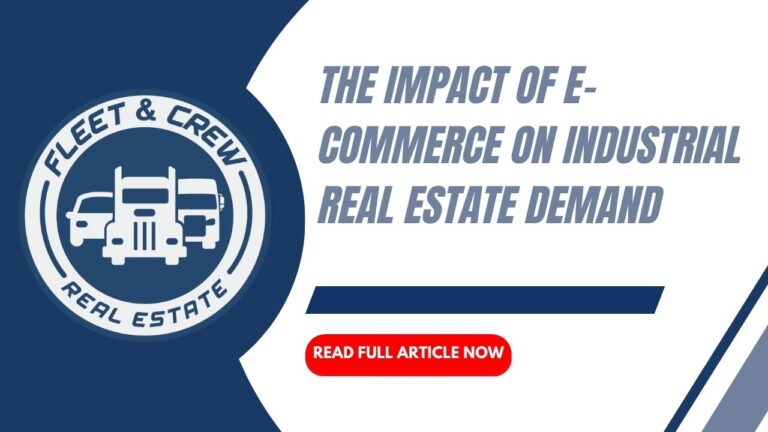In recent years, the demand for industrial real estate has been steadily increasing. With the rise of e-commerce, advancements in technology, and changes in consumer behavior, businesses are expanding their operations and requiring larger and more efficient spaces. This comprehensive guide will delve into the reasons behind the rising demand for industrial real estate and explore the key factors that are driving this trend.
- E-commerce Boom
The explosive growth of e-commerce has transformed the retail landscape and created a surge in demand for industrial real estate. Online retailers require large distribution centers and warehouses to store inventory and fulfill customer orders efficiently. With the increasing expectations of fast and reliable delivery, businesses need strategically located facilities that can handle high volumes of products. As a result, e-commerce companies are driving the need for larger industrial spaces closer to urban centers, enabling faster last-mile deliveries.
- Supply Chain Optimization
Efficiency in the supply chain has become a critical factor for businesses seeking a competitive edge. Industrial real estate plays a vital role in optimizing the supply chain by providing well-located facilities that streamline logistics operations. By strategically locating warehouses and distribution centers, businesses can reduce transportation costs, minimize delivery times, and improve overall customer satisfaction. The demand for industrial real estate is, therefore, driven by the need to create efficient supply chain networks.
- Technological Advancements
Technological advancements are reshaping industries across the board, and the real estate sector is no exception. Industrial facilities are now incorporating advanced technologies such as automation, robotics, artificial intelligence, and the Internet of Things (IoT) to improve operational efficiency. These innovations require specialized spaces and infrastructure to accommodate the integration of new technologies. As businesses embrace Industry 4.0, the demand for industrial real estate that can support these advanced systems continues to rise.
- Changing Consumer Behavior
Consumers today expect fast, convenient, and personalized shopping experiences. As a result, businesses are adapting their operations to meet these evolving demands. To cater to consumer expectations, companies are implementing strategies like same-day delivery, click-and-collect services, and flexible return policies. These changes in consumer behavior have led to an increased need for industrial real estate in urban areas, allowing businesses to establish distribution hubs in proximity to their customer base.
- Urbanization and Land Scarcity
Rapid urbanization and land scarcity in densely populated areas have contributed to the rising demand for industrial real estate. As urban areas expand, industrial facilities are required to be closer to consumers to ensure efficient delivery and minimize transportation costs. However, finding suitable land for industrial development in urban centers can be challenging. As a result, developers are repurposing existing industrial spaces or transforming underutilized properties into modern industrial facilities, maximizing the use of limited land resources.
- Expansion of Manufacturing Sector
The manufacturing sector is experiencing a resurgence in many regions, driven by factors such as technological advancements, favorable government policies, and shifting global supply chains. This growth has led to an increased demand for industrial real estate, as manufacturing companies require larger spaces for production, storage, and distribution. The need for specialized infrastructure, such as factories with high ceilings and heavy-duty equipment, further fuels the demand for industrial properties.
- Investment Opportunities
The rising demand for industrial real estate has caught the attention of investors seeking lucrative opportunities. The stable income streams generated by industrial properties, coupled with long lease terms and potential capital appreciation, make them an attractive investment option. Institutional investors, real estate investment trusts (REITs), and private equity firms are actively investing in industrial real estate assets, further driving the demand and stimulating development in the sector.
The demand for industrial real estate continues to surge as businesses adapt to the changing landscape of e-commerce, supply chain optimization, technological advancements, and evolving consumer behavior. The need for strategically located warehouses and distribution centers, coupled with the expansion of the manufacturing sector, has contributed to this trend. Additionally, urbanization, land scarcity, and the attractive investment potential of industrial properties have further fueled the demand. As the industrial real estate market evolves, developers, investors, and businesses must stay attuned to these trends to capitalize on the opportunities presented by this growing sector.




